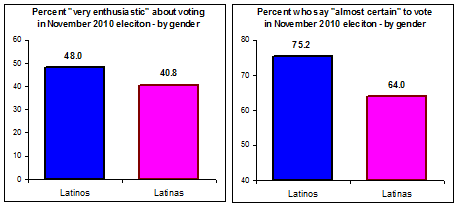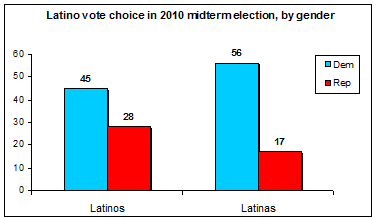The bestselling book, Men are from Mars, Women are from Venus, is about the myriad emotional and romantic differences between the two sexes. Politics was not covered in this book, but it might as well have been. More specifically gender differences in politics exist and are largely immune to ethnicity; leading up to the 2010 midterm election some gender differences are mirrored in Latino and non-Latino populations that could have huge political implications on election day.
Two recent polls, sampling two different populations of registered voters (Latinos and non-Latinos) came to very similar conclusions – men are fired up about the upcoming elections. A Latino Decisions poll and a New York Times/CBS News poll find that in comparison to women, men are more angry, paying a lot of attention to politics and enthusiastic about the upcoming election, and more likely to vote Republican. Some similar trends emerge among Latino y Latina voters. While 28% of Latina survey respondents in the LD tracking poll indicate that they are following political news “very closely”, their male counterparts rate are 10 percentage points higher at 38%. Enthusiasm about voting in November is also in greater supply among males with 48% Latino men being very enthusiastic and 41% of Latinas having the same sentiment.

The New York Times/CBS News poll suggests that the overwhelming issue of concern among men is the economy. This same pattern is reflected in the Latino Decisions sample. The number one issue for Latino men is the economy, with 30% of men indicating this as the most important issue for the 2010 election. Immigration came in at a distant second. The picture among Latinas is rather different—the concern portfolio is much more diversified. The top issue of concern was equally divided between immigration and the economy, with approximately 20% of Latinas stating that these were the most important issues in this election. Twelve percent of the these women saw jobs as the main issue, and finally education came in with its share of 9% of the sample. While the economy is also a top issue for Latina women, immigration slightly edges it out. More specifically, we see that Latinas show consistently higher levels of opposition to the Arizona immigration law and more frustration at the lack of inactivity by the part of the federal government to put forward immigration reform.
The Latino Decisions and New York Times/CBS News polls both reinforce the well-established gender gap, with women preferring Democratic candidates for Congress at a rate much higher than their male counterparts. Among non-Latino white populations men are more likely to prefer a Republican candidate, while women a Democratic candidate. This exact pattern is not seen among Latinos, but the higher levels of support for a Democratic candidate vis-à-vis a Republican one are evidenced. The difference in the two samples is the much higher Democratic baseline preference among Latinos resulting in a wider gap. Among Latinas there is a 37 percent point gap; 56% percent of Latinas stating their intended congressional vote choice is Democratic and 18% stating it is Republican. Among Latino males, the gap is reduced, to where the preference for a Democratic over a Republican congressional candidate is 17% (45% Dem; 28% Rep).

The marked preference for the Democratic party among Latinas is also seen in partisanship. Fifty-three percent of Latinas identify as Democrats and 45% of Latino men identify as such. An interesting partisan difference emerges in terms of the number of Independents. Fewer women identify as Independents (20%) which means that there is a larger pool of potential swing voters in the roughly 27% of Latino men who identify as Independent. Among a group that is viewed as potential swing voters, Latino males could be considered the swingiest of the swingers.
The picture that arises from the Latino Decisions poll, as well as the New York Times/CBS Poll, is that of men with an intent focus on the political arena resulting from their concern with the economy. In the Latino Decisions poll over 75% of men indicated that they were almost certain to vote, while only 64% of women indicated the same. If rates of partisanship, vote preference, and turnout among men, especially Latino men, translates into actions then this spells trouble for the Democrats.
Talk is cheap and we know that since 1964 the number of women voters has exceeded the number of male voters in every presidential election. In the 2008 election Latina turnout was over 6% higher than Latino turnout (Center for American Women and Politics). If the past is the best predictor of the future, then the expressed enthusiasm and interest by the part of men may not make it to the voting booth. Women may not have a single-minded issue focus or display as much interest as men this election season, yet we know women vote. In politics, anything can happen and come election day we will see whether men are indeed fired up and tangibly demonstrate their frustrations in the voting booth.
Dr. Victoria M. DeFrancesco Soto is an Assistant Professor of Political Science at Northwestern University and a Faculty Fellow at Northwestern’s Institute for Policy Research. She received her Ph.D. from Duke University in 2007.

